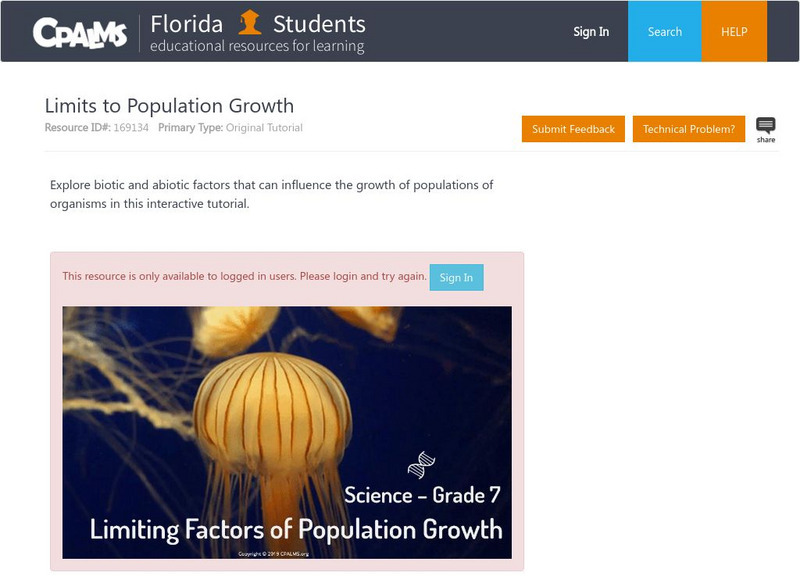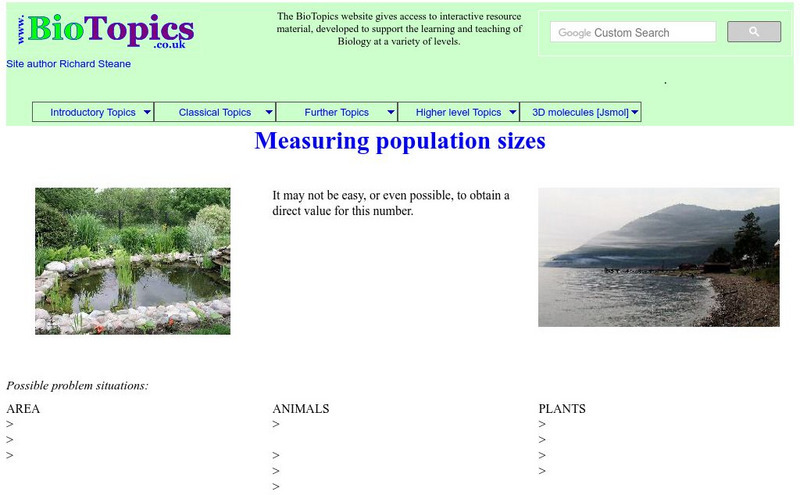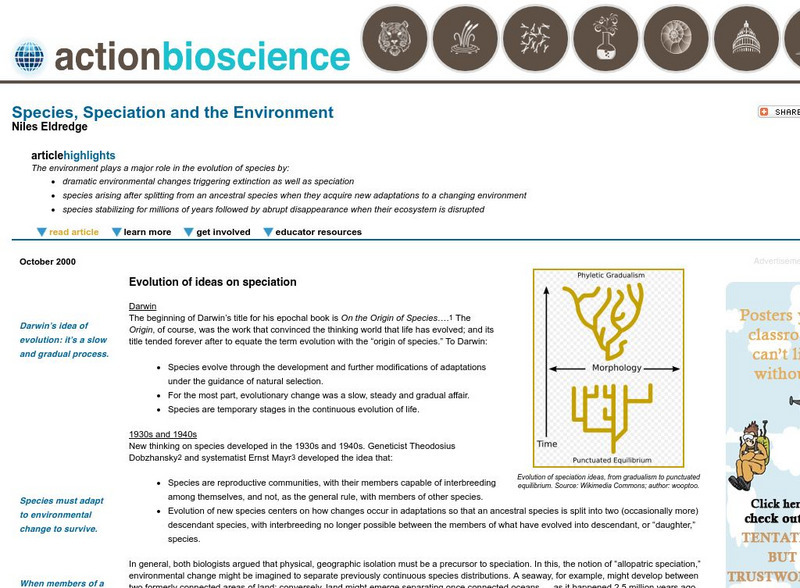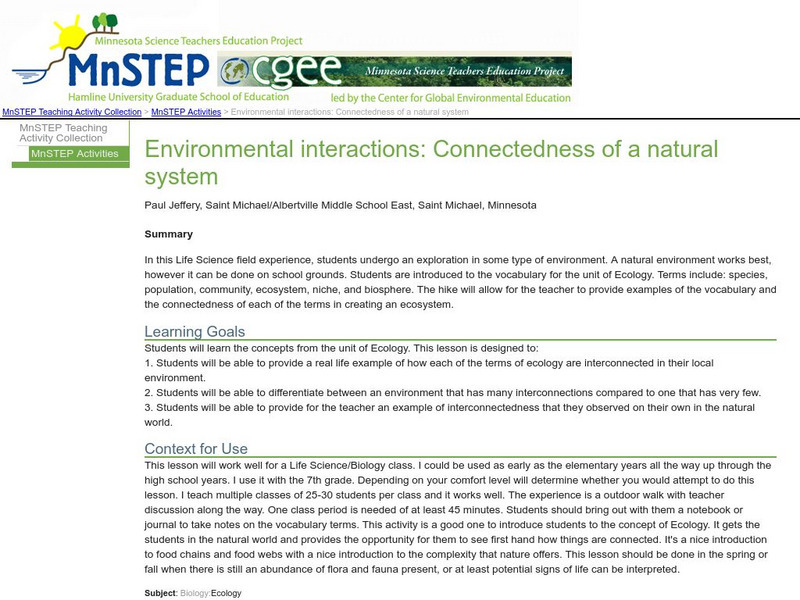Hi, what do you want to do?
SMART Technologies
Smart: Energy Flow in an Ecosystem
Students learn about Abiotic and Biotic Factors and how they affect the ecosystem in which an animal might live in.
Other
Pde Sas: Relationships Among Organisms
In this lesson plan, students compare various types of relationships among organisms (i.e., biotic interactions). Students will: explain the roles of producers and consumers, and predators and prey in an ecosystem. Explain the levels of...
CK-12 Foundation
Ck 12: Earth Science: Biological Communities Study Guide
Review the relationship between populations and ecosystems.
PBS
Pbs Learning Media: How Disruptions Affect Animal Populations
Students explore the effects that ecosystem disruptions can have on animal populations. They learn about the disruptions that have driven three species-the Madagascar fish eagle, the Iberian lynx, and the rowi kiwi, to the brink of...
National Geographic
National Geographic: Symbiotic Relationships in Marine Ecosystems
In this lesson students analyze videos to make observations about species, populations, and communities of organisms and discuss their symbiotic relationships. Then they create a hypothetical marine ecosystem and describe the adaptive,...
Concord Consortium
Concord Consortium: Stem Resources: Predators and Prey
Did you ever want to be a hawk? In this virtual ecosystem, students will take on the role of a hawk and try to catch rabbits on a snowy field. Students will see which rabbits have adaptations that allow them to blend into the environment...
National Geographic
National Geographic: Oil and Bird Populations
After learning about the diversity of wildlife in the Gulf of Mexico, students focus on birds and their patterns of behavior. They then how an oil spill might affect migrating birds, and possible ways to help them in the event of an oil...
PBS
Pbs: River Rewilding: Grand River Restoration and Revitalization Project
A unit for students to look at the economic opportunities associated with a river. Students will explore the Grand River Revitalization & Restoration Project. In this unit, they will also learn about two species impacted by the...
Scholastic
Scholastic: Study Jams! Science: Ecosystems: Population Growth
Population in areas is most often determined by environmental factors. This video and the test will help ensure understanding of the trends of population growth with scientific evidence.
Concord Consortium
Concord Consortium: Dam Removing: Changes in the Environment Affect Population
What happens to a population when the environment changes? Students remove a dam that divides an ecosystem to illustrate the effects of environmental changes. Students observe and collect data as the grass and then the rabbit populations...
PBS
Pbs Learning Media: A Subsistence Culture Impacted by Climate Change
This short video explains how warmer temperatures in the Arctic are transforming the ecosystem and affecting the Athabaskan people, threatening their way of life. [2:59]
PBS
Pbs Teachers: Alien Invasion: Estimating a Snake Population [Pdf]
Learn about the effects of alien species on native environments and explore biologists' use of capture/recapture statistics and analysis of sampling techniques by estimating the population size of a tagged species.
CPALMS
Florida State University Cpalms: Florida Students: Limits to Population Growth
Explore biotic and abiotic factors that can influence the growth of populations of organisms in this interactive tutorial.
Bio Topics
Bio Topics: Measuring Population Sizes
Read and understand the concept of ecological population counts and sizes. Hover the mouse over questions to reveal the answers as you sharpen your skills.
American Institute of Biological Sciences
Action Bioscience: Species, Speciation and the Environment
The American Institute of Biological Sciences offers this article by Niles Eldredge, evolutionary theorist and curator at the American Museum of Natural History. Eldredge begins with Darwin's theories and summarizes subsequent thought,...
Alabama Learning Exchange
Alex: Endangered Species
This is a biology or environmental science instructional activity that incorporates technology. This project-based plan is designed to be used as students study the factors that affect the dynamic equilibrium of populations and...
Utah Education Network
Uen: Human Settlement and Geography
Learn why people live in places with lots of people.
Concord Consortium
Concord Consortium: Dam Building: How Changes in Environment Affect Population
In this simulation, students build a dam in the middle of a field, dividing an ecosystem in half to illustrate the effects of environmental changes. They watch and collect data as the grass and then the rabbit populations in that region...
Other
Western North Carolina Vitality Index: Ecosystem Threats
The forests of Western North Carolina are threatened by a wide variety of environmental stressors and disturbances, such as insects, disease, invasive species, drought, fire, hurricanes, tornadoes, and ice storms. A stressor is any kind...
University of California
University of California Berkeley: Ecosystem Equilibrium
A simulator reviewing over the concepts of ecosystem equilibrium.
Science Education Resource Center at Carleton College
Serc: Environmental Interactions: Connectedness of a Natural System
A field experience where students undergo an exploration in a natural environment. They are introduced to the concepts of species, population, community, ecosystem, niche, and biosphere.
Utah STEM Foundation
Utah Stem Action Center: Great Salt Lake Ecosystem
This lesson plan provides an eight-day flow of educational activities in which students use the Great Salt Lake ecosystem to explore food webs and how changes in living and nonliving factors affect different populations.
American Geosciences Institute
American Geosciences Institute: Earth Science Week: Sea Level and the Terrapin
Students build a model ecosystem to simulate the life and limiting factors of the Terrapin turtle.
CK-12 Foundation
Ck 12: Earth Science: Agriculture and Human Population Growth Study Guide
[Free Registration/Login may be required to access all resource tools.] Summarizes the key points about the evolution of agriculture and how it has impacted human population growth. Includes a few questions to check for understanding.











![Pbs Teachers: Alien Invasion: Estimating a Snake Population [Pdf] Activity Pbs Teachers: Alien Invasion: Estimating a Snake Population [Pdf] Activity](https://content.lessonplanet.com/knovation/original/42719-3ab379f516ca5265608d3b9539483f02.jpg?1661419221)








